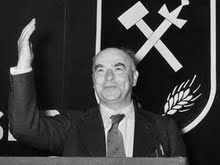Otto Strasser was a dissident Nazi who eventually left
the NSDAP and formed the Black Front, a competing organization. When Hitler
grabbed power in Germany in 1933, Strasser was forced to flee for his life, and
eventually settled in North America. Several books by this intractable thinker
have been published in English. Of these, "Flight from terror" and
"Germany Tomorrow" are the most interesting and well written.
"Germany Tomorrow" contains Strasser's proposals for a peace agreement between Germany and the Allies, and his thoughts about the future of both Germany, Europe and the world. The book was published in 1940, i.e. before the Nazi attack on the Soviet Union and the entry of the United States into the war. Strasser in effect proposes an alliance between Germany, Britain and France to fight the Soviet Union and "liberate" the Ukraine, Belarus and the Transcaucasus. Strasser even says that Europe needs these areas as internal colonies.
At the same time, Strasser believed that Germany should make major concessions to its European adversaries: the independence of Austria, reparations to Czechoslovakia and Poland, the re-establishment of the Maginot Line, and the ceding of Heligoland to Britain. He does want to keep the Polish corridor and East Prussia, but proposes that Poland in return gets effective control of the Baltic republics. A German federation, the internal partition of Prussia and a volunteer army rather than a conscript army are other proposals to appease the Western powers. Jews should be permitted to leave for Palestine or get minority rights within a new Germany.
Small wonder Hitler considered Strasser a traitor and wanted him dead!
Strasser's proposals for the internal re-organization of Germany are somewhat disingenuous. Despite his calls for a German federation, it's pretty obvious that the "federation" would really be centralized, with state-owned banks and companies, a national insurance system and a state monopoly on foreign trade. The German president would be elected for life, and thus really act as a king or emperor, and he would also appoint the state presidents. It's equally obvious that New Germany wouldn't be particularly democratic. In Strasser's scheme, all political parties are abolished in favour of a corporatist system based on estates, in which the two largest estates (workers and peasants) are underrepresented. For symbolic reasons, Strasser wanted Ratisbon (Regensburg), the erstwhile capital of the Holy Roman Empire, to become the new federal capital. Naturally, the new nation should be based on Christianity, which the author regards as somehow quintessentially Western. However, Strasser was also something of a bon vivant, for which Hitler sharply rebuked him, so presumably his Christianity would be of the more beer-swilling type. (But then, I suppose both G.K. Chesterton and C.S. Lewis liked good food and drink!)
More interesting, perhaps, are Strasser's economic proposals, which are similar to those of Distributism, albeit perhaps more collectivist. All land should be held in common and administered by local councils, which parcel out the land to individual farmers based on a system similar to usufruct. The land can be inherited but not sold. Also, townspeople should move out to the countryside and become peasants (a back-to-the-land movement). Various guilds and cooperatives are also part of the new economic system, which Strasser actually calls "socialism" and "planned economy".
Strasser further advocates a European Federation. There is some tension between his peace proposals and the idea of a European Federation, since the peace proposals presuppose that Britain and France remain strong military powers, while the European Federation would rather have a joint army, while the individual nations would only keep militia units. (At least I think that's what the author has in mind.) There is also some tension between the notion of German autarky, the idea of European autarky with free trade within Europe, and various colonial schemes proposed by the author, both in Africa and at least implicitly on territories wrested or "liberated" from the Soviet Union. "Germany Tomorrow" also contains a number of appendices, in which Otto Strasser pays frequent tributes to his brother, the "left wing" Nazi Gregor Strasser, who was murdered on Hitler's orders in 1934.
When I read "Flight from terror" and "Hitler and I", Strasser's political program struck me as extremely eclectic. However, this book reveals Strasser to have been eclectic in word only. If the rhetoric about federation, socialism and "people's state" is stripped away, it's obvious that Strasser simply proposed another version of the fascist program, a kind of paternalistic, conservative and seemingly benign fascism. Perhaps a fascism with a human face? In reality, I suspect that a Strasserite New Germany would eventually have resembled Mussolini's Italy or Franco's Spain. Or is it really Austro-Fascism in Lesser German disguise? As for the human face, the European Federation would presumably have started another world war against the USSR and continued the exploitation of the Third World.
I'm sure Britain and France would have loved somebody like Otto Strasser as president for life of Germany. In the event, they were stuck with Hitler, and eventually had to fight Nazi Germany to the death...alongside Roosevelt and Stalin.
Which, in the final analysis, might have been the lesser evil.

No comments:
Post a Comment